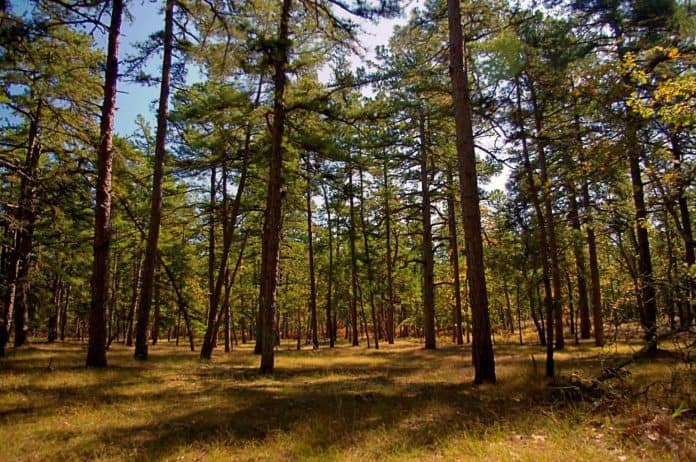
HOWELL – An updated ordinance approved by township officials changes the fees developers need to pay when they want to remove trees as part of their construction projects.
Before, if developers had to remove more trees than they could replace on the site, they were expected to contribute to the Township Tree Fund instead. In the past, this payment was $300 per tree. However, with the new changes, this payment has been increased to $400 per tree.
The highest amount developers are asked to contribute to the tree fund for this purpose has been increased from $35,000 to $45,000.
One of the main ideas behind these changes is to encourage developers to think more about planting trees rather than just paying the fees. This way, the town can keep its greenery intact. Additionally, the extra money collected in the Tree Fund can be used for various projects that benefit the community.
Lisa Doud spoke on behalf of the Howell Shade Tree Commission at the council meeting. She began by reading a letter addressed to council members, the town manager, and the community development team concerning the proposed revisions to increase contributions to the township tree fund.
“The Commission believes that since the tree fund contribution has not been increased in over ten years, and that the proposed increase to the tree fund contribution amount is a positive step for the town to reflect the rising cost of inflation,” read Doud. “This increase is an initial step toward further ordinance revisions that benefit the preservation of the tree canopy in Howell.”
Doud emphasized that the Shade Tree Commission had thoroughly reviewed the proposed changes, highlighting that the contribution to the tree fund had remained stagnant for over a decade. The Shade Tree Commission also made the following recommendations, summed up as follows:
- Tree fund increase should accurately reflect inflation rates and therefore be set at a range of $483 per tree and $54,500 per developed acre.
- Adoption of contributions changed to $483 per tree and $54,500 per developed acre in lieu of the increase from $400 per tree and $45,000 per developed acre.
- Establishment of an annual tree fund contribution adjustment linked to the rate of inflation.
- Collaborative review of the existing woodlands management ordinances involving members from the shade tree commission, the township council, and township officials.
Local resident Marc Parisi, a former member of the Shade Tree Commission, related some history concerning prior attempts to update the woodlands management and tree fund ordinances.
“One of the first things that we endeavor to do in early 2020 pre-COVID was to address this very issue,” said Parisi. “It was brought up in the master plan re-exam of 2019.”
The catalyst for revisiting these ordinances was the concern over developers predominantly choosing to pay into the tree fund rather than replanting trees off-site. According to Parisi, the planning board attorney worked with the Shade Tree Commission to review proposed changes and stated that he’d never seen a developer come in and elect to replant the trees.
“We never saw anybody replanting off-site because it was cheaper to pay into the fund than it was to buy the trees and plant the trees and have to make sure that they stay alive and healthy and thrive, ” Parisi added.
A team of people worked to draft the ordinance using the numbers in the updated ordinance. Parisi said that the proposed ordinance was sent to township administration and sat for three years. He highlighted that the delay in enacting the ordinance has led to missed opportunities.
Parisi expressed frustration over the lack of action, particularly in light of numerous development applications involving significant tree removal. He pointed out that the increase per tree would have resulted in a tremendous windfall in the tree fund had it been enacted sooner.
“Last year, we amended the ordinance to allow for using those funds to buy open space,” said Parisi. “It would have been nice if we had an extra million dollars in the tree fund (with the additional contributions.)”
Township Manager Joe Clark was the municipality’s legal counsel when the proposed ordinance was submitted for review. He explained that the tree fund rules had been challenged several times and were part of a lawsuit.
“The applicants for Monmouth Commerce Center actually included it in their first lawsuit,” said Clark. “It didn’t appear in their Amended Complaint, but it was still the wrong time to do anything with the tree fund and open up a challenge.”
Monmouth Commerce Center recently sold the property and removed its application from the planning board.
Before the final vote on the ordinance, council members deliberated over the feedback provided by Doud on behalf of the Shade Tree Commission. Clark added that changing the fees now would require reintroducing and passing the ordinance again later.
Mayor Theresa Berger acknowledged Doud’s comments and suggested a more frequent review of the ordinance. Meanwhile, Clark expressed reservations about relying solely on the inflation rate as the basis for adjustments.
“I’m not entirely sure that inflation rate alone is the best metric to use to adjust this particular ordinance, especially not to tether it to an annual sort of self-executing adjustment,” noted Clark. “We have to remember that the real fundamental basis of it is that we’re gauging in on the replacement cost of a tree.”
The ordinance was unanimously adopted by the mayor and Town Council.







